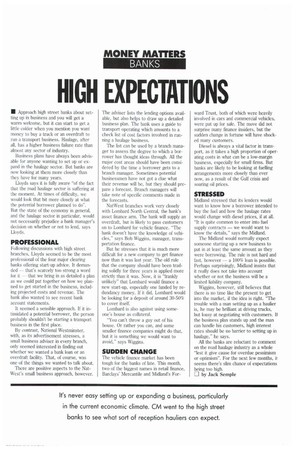HI GH EXPECTATIONS
Page 27

If you've noticed an error in this article please click here to report it so we can fix it.
• Approach high street banks about setting up in business and you will get a warm welcome, but it can start to get a. little colder when you mention you want money to buy a truck or an overdraft to run a transport business. Haulage, after all, has a higher business failure rate than almost any sector of industry.
Business plans have always been advisable for anyone wanting to set up or expand in the haulage sector. But banks are now looking at them more closely than they have for many years.
Lloyds says it is fully aware "of the fact that the road haulage sector is suffering at the moment. At times of difficulty, we would look that bit more closely at what the potential borrower planned to do". Rut the state of the economy in general, and the haulage sector in particular, would not necessarily prejudice a bank manager's decision on whether or not to lend, says Lloyds.
Following discussions with high street branches, Lloyds seemed to be the most professional of the four major clearing banks offering start-up advice, it deman ded that's scarcely too strong a word for it — that we bring in as detailed a plan as we could put together on how we planned to get started in the business, including projected costs and revenue. The bank also wanted to see recent bank account statements.
It seemed a sensible approach. If it intimidated a potential borrower, the person probably shouldn't be starting a transport business in the first place.
By contrast, National Westminster, with, as its advertisement stresses, a small business adviser in every branch, only seemed interested in finding out whether we wanted a bank loan or an overdraft facility. That, of course, was one of the things we wanted to talk about.
There are positive aspects to the NatWest's small business approach, however. The adviser lists the lending options available, but also helps to draw up a detailed business plan. The bank uses a guide to transport operating which amounts to a check list of cost factors involved in running a haulage business.
The list can be used by a branch manager to assess the degree to which a borrower has thought ideas through. All the major cost areas should have been considered by the time a borrower gets to a branch manager. Sometimes potential businessmen have not got a clue what their revenue will be, but they should prepare a forecast. Branch managers will take note of specific comments made in the forecasts.
NatWest branches work very closely with Lombard North Central, the bank's asset finance arm. `Ile bank will supply an overdraft, but is likely to pass customers on to Lombard for vehicle finance. "The bank doesn't have the knowledge of vehicles," says Bob Wiggins, manager, transportation finance.
But he stresses that it is much more difficult for a new company to get finance now than it was last year. The old rule that the company should have been trading solidly for three years is applied more strictly than it was. Now, it is "frankly unlikely" that Lombard would finance a new start-up, especially one funded by redundancy money. If it did, Lombard would be looking for a deposit of around 30-50% to cover itself.
Lombard is also against using someone's house as collateral.
"You can't throw a guy out of his house. Or rather you can, and some smaller finance companies might do that, but it is something we would want to avoid." says Wiggins.
The vehicle finance market has been tough for the banks of late. This month, two of the biggest names in retail finance, Barclays' Mercantile and Midland's For ward Trust, both of which were heavily involved in cars and commercial vehicles, were put up for sale. The move did not surprise many finance insiders, but the sudden change in fortune will have shocked many customers.
Diesel is always a vital factor in transport, as it takes a high proportion of operating costs in what can be a low-margin business, especially for small firms. But banks are likely to be looking at fuelling arrangements more closely than ever now, as a result of the Gulf crisis and soaring oil prices.
Midland stressed that its lenders would want to know how a borrower intended to buy the fuel and how the haulage rates would change with diesel prices, if at all. "It is quite common to enter into fuel supply contracts — we would want to know the details," says the Midland.
The Midland would normally expect someone starting up a new business to put in at least the same amount as they were borrowing. The rule is not hard and fast, however — a 100% loan is possible. Perhaps surprisingly, Midland insists that it really does not take into account whether or not the business will be a limited liability company.
Wiggins, however, still believes that there is no time like the present to get into the market, if the idea is right. "The trouble with a man setting up as a haulier is, he may be brilliant at driving trucks, but lousy at negotiating with customers. If the business plan stands up and the man can handle his customers, high interest rates should be no barrier to setting up in haulage," he says.
All the banks are reluctant to comment on the road haulage industry as a whole "lest it give cause for overdue pessimism or optimism". For the next few months, it seems there's slim chance of expectations being too high.
by Jack Semple




















































































